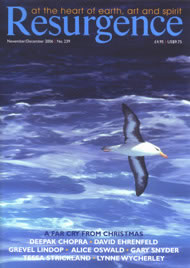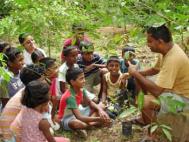AS I SAT in a hotel lobby in Negombo, Sri Lanka, awaiting the arrival of Damitha Rajapakse, I pondered on the vast numbers of flies that seemed to enjoy the darker environs of the building. In other hotels, the premises were routinely sprayed with chemical insecticides, but this was an ‘eco-hotel’ which had made a commitment not to use chemicals of any kind, so the flies were flourishing. I mentioned this to Damitha, founder of the Biodiversity Lifeskills Foundation (BLF) in Sri Lanka, and his response set the tone for a very positive and rewarding meeting.
Damitha explained how, in years gone by, local people would have swept the floors of their houses (and hotel lobbies) with brooms made from the korokaha tree, which has antiseptic and insect-repellent properties. Sadly, due to rapid urbanisation and globalisation in Sri Lanka, this and much other traditional knowledge of plant biodiversity and usage is disappearing. Yet despite this, Sri Lanka is still an incredibly biodiverse country with the potential to be self-sufficient in many of its raw material needs, and its native wild plants have unique nutritional and medicinal properties. Many of these species were planted in temple complexes and can still be found there today. It is this link with religion that Damitha is exploring with BLF.
In Sri Lanka 70% of the population is Buddhist. In the past, Buddhist monasteries provided the community not only with religious guidance but with many additional services such as community healing centres using medicines made from the plant species in the temple grounds. Local communities were actively encouraged to use the temple yards in this way, thus the relationship between the community and the monasteries was mutually beneficial.
The Biodiversity Lifeskills Foundation is encouraging temples and communities to rekindle these sacred traditions by incorporating basic plant knowledge concepts at Sunday School level. Not only does this mean that traditional knowledge is collected, databased and disseminated via BLF, but it impresses upon younger generations the importance of conservation and use of natural resources. The children learn about the traditional uses of plants and are given specimens from the Foundation’s own nursery which they can then take home and establish in their own back yards.
To aid the replenishment of the temple grounds, BLF has established an arboretum of rare timber-species, wild fruits and medicinal plants, with over seventy species to date, and has established a gene bank of seeds of rarer species. It also aims to create a Nature Museum, depicting how these trees and shrubs would have been used in traditional communities.
For further information or to visit the arboretum, contact Damitha Rajapakse, Biodiversity Lifeskills Foundation, No 258 Orutota Road, Mudungoda, Sri Lanka. Tel: + 033 222 4023. [email protected]
Lorna Howarth is Co-editor of Resurgence.








